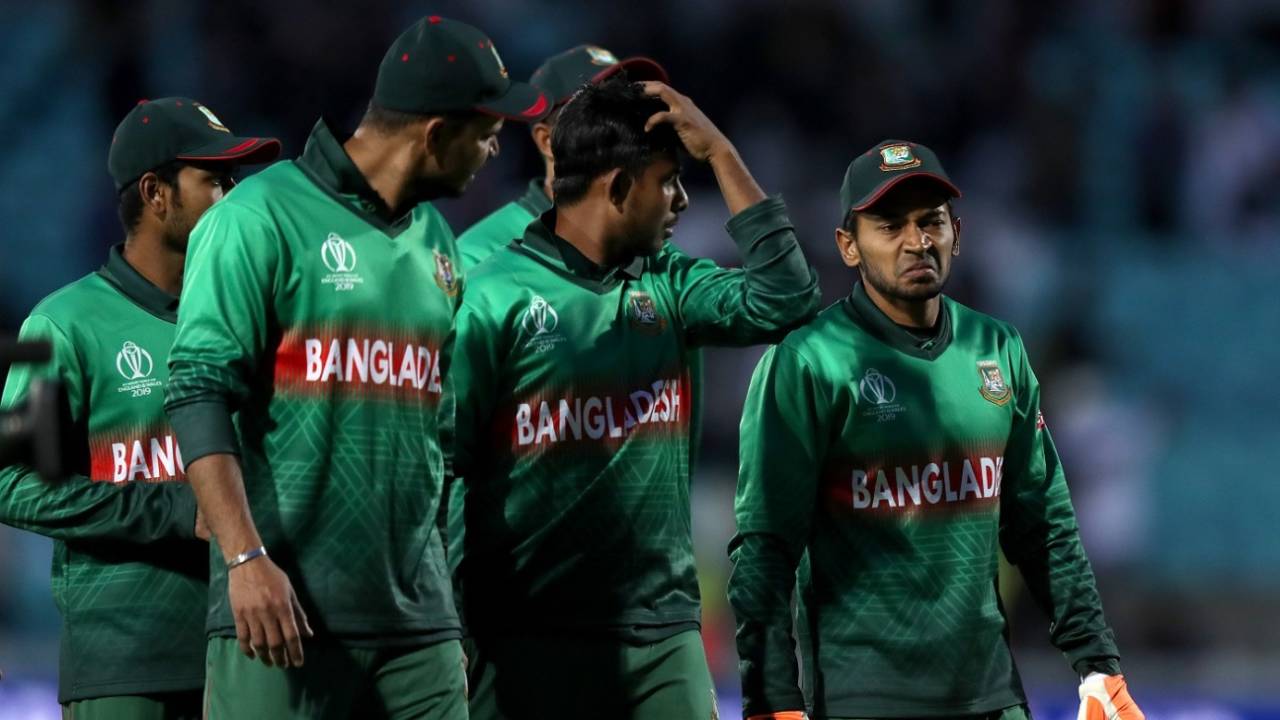Bangladesh cricket in need of systemic overhaul
The BCB is an administrative mess and needs to get its house in order before its too late
Mohammad Isam
06-Aug-2019
Getty Images
For the longest time now, Bangladesh's success has come despite the system in place back home. Yet, incredibly, while the spotlight is always on the players when they go through a string of losses, the guns are never trained on the administrators, who run the game in the country.
Bangladesh are in the midst of their worst run since the horrors of 2014. Their captain, Mashrafe Mortaza, had a stinker of a World Cup, the torn hamstring he played with not helping matters. The pace attack has been frustratingly inconsistent, and younger batsmen haven't stepped up when the seniors have had bad days. The result: eighth at the World Cup, a 3-0 whitewash in Sri Lanka.
What about the 'A' team? Well, there isn't much encouragement there, either. Bangladesh A were dominated at home by Afghanistan A in the four-day matches, before they somehow scrambled to a 2-2 draw in the one-dayers. Elsewhere, a representative side from Bangladesh, boasting of a number of Test cricketers, failed to qualify for the finals of a regional tournament in Bengaluru - where they had gone to get acclimatised before a Test tour to India later this year.
These results haven't quite shaken the BCB into taking strong cricketing decisions. Board president Nazmul Hassan has pointed fingers in many directions without really giving any direction. The board has parted ways with coach Steve Rhodes because he was, essentially, "a nice man", and handed over the coaching duties, temporarily, to Khaled Mahmud, the board's busiest director.
The BCB has also backtracked from its original decision to discontinue the term of chief selector Minhajul Abedin, whose contract expired after the World Cup. Why? Because a newspaper criticised the board's potential replacement candidate. Now, it is reconsidering Chandika Hathurusingha's candidature for head coach, less than two years after his unceremonious exit after a fallout with the players.
Now to Bangladesh's on-field problems. As such, there are no solutions in sight. Only Shakib Al Hasan has so far spoken about the need for an injury management system and player-rotation policy. Elsewhere, internal discussions in the board have only revolved around new coaching staff, almost as if to say that is the best solution to the team's problems.

AFP
What is the way forward?
For starters, Hassan has to let the BCB run "normally". He has been the biggest influencer for all vital decisions over the last six years, usually consulting only a small group of directors, even as many others are kept in the dark. Those who attend BCB board meetings say it's merely an exercise in raising hands to decisions that have already been decided by Hassan and his coterie.
Then there are issues over umpiring, which is in a shambles. The Dhaka league structure is the main source for most professional cricketers in Bangladesh, and biased umpiring does nobody any favours. There have been extensive reports of umpires and match referees ensuring clubs aligned with the BCB's powerful directors win every league game. The rest of the clubs are losing interest in organising and raising finances to participate because of this. If the four-tiered club cricket system continues to be used as a political tool, quality cricketers might be hard to find in a few years.
Thirdly, Bangladesh must look at tapping into the experience of its first-class cricketers. Being discarded from the national team shouldn't mean a cricketer is unworthy. And the BCB must do something to ensure the best domestic performers remain in contention for the 'A' sides.
Without a second batch of ready cricketers, Bangladesh are already facing a challenge to find quality understudies for the likes of Soumya Sarkar, Liton Das and Sabbir Rahman, let alone replacing Mashrafe, Shakib, Tamim Iqbal, Mahmudullah and Mushfiqur Rahim when the time comes. The dip in form of Tamim and Mahmudullah as already set tongues wagging about their presence in the team. But the truth is, there aren't too many in the country capable of stepping up at the moment.
Now to another gaping issue: the absence of a genuine legspinner in the system. The only one to play Tests, Jubair Hossain, was treated so shabbily in domestic cricket that he's been reduced to being a net bowler. Just like how questions of bench strength are raised every time a senior batsman fails, this one about legspin also comes up ahead of big events.
Taking big decisions in the aftermath of big tournaments, concerning only big players, does great disservice to the game at large, and BCB should correct its ways before Bangladesh's cricket hits the abyss.
Mohammad Isam is ESPNcricinfo's Bangladesh correspondent. @isam84
